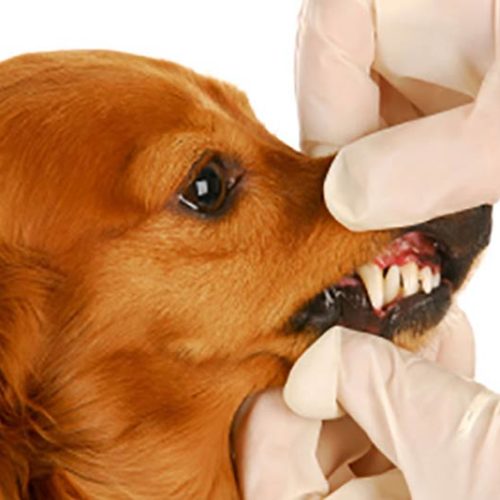With proper daily oral care and a healthy diet, you can make a positive difference in the health of your dog’s teeth and gums.
When it comes to taking care of their dog’s health, most pet owners think about vaccinations, regular vet visits, nutritious food, and exercise. Unfortunately, an oral care regimen isn’t a top priority for them. But it should be: 4 out of 5 dogs over age 3 develop periodontal disease.*
Oral care: It’s more important than just white teeth
The fact that so many dogs eventually develop periodontal disease is startling. But in some cases the problem can be even more serious: It’s been shown that periodontal disease, if left untreated, is associated with the development of other serious health problems for a dog. This happens because bacteria from the mouth may enter the bloodstream and spread to the heart, lung, kidneys, and other organs.
So, as you can see, proper oral care for your dog is about more than just fresher breath and white teeth. Tartar also provides a home for more plaque buildup, which can irritate the gums, and may result in a common condition known as gingivitis. If not removed, foods particles mix with saliva and bacteria to form plaque.
Within a few days, plaque calcifies and hardens into tartar (sometimes called calculus).

How teeth & gum problems begin
Every time your dog eats, food particles stick to his teeth-and where there’s food, there’s bacteria.
Warning signs of gingivitis include:
- - Bad breath
- - Reddening and swelling of the gums where they meet the teeth
- - Bleeding of the gums
Gingivitis, or inflammation of the gums, is a beginning stage of periodontal disease. Once gingivitis develops, the gums begin to recede and separate from the teeth. The space between them can become filled with even more food and bacteria, thereby exacerbating the problem. Gingivitis is reversible with proper oral care. If left untreated, however, gingivitis usually can progress to periodontitis, a nonreversible stage of periodontal disease. This condition can result in bone and tooth loss, along with infection. So, as you can see, it’s important to begin an oral care routine early in your dog’s life-and then maintain it on a daily basis.
Tips for better oral care
Daily brushing-The best way to help keep your dog’s teeth clean is to brush them daily. You’ll find a variety of specially designed toothbrushes for dogs at your local pet specialty store, or you can use a very soft human toothbrush. But be sure to use only toothpaste that is developed for dogs. Toothpaste made for humans contains fluoride and detergents that can become harmful when swallowed by your dog. It’s easy to figure out how to brush dog teeth.
Regular veterinary exams and cleanings-In addition to toothbrushing, regular dental exams and cleanings by your veterinarian will help to keep your dog’s mouth healthy. Your vet can help spot and treat problems before they become more serious issues.
The role of diet in better oral care
What you feed your dog can have a significant impact on the health of his teeth and gums.
Proper diet-Studies show that, in general, dry food helps keep teeth clean by reducing plaque and tartar accumulation on the teeth. This special shape was developed based on research from WALTHAM, THE WORLD’S LEADING AUTHORITY ON PET CARE AND NUTRITION®-and helps clean teeth down to the gum line while your pet chews.
In addition, you can feed your dog specially designed oral care snacks & treats. These treats are clinically proven to reduce tartar buildup by up to 80%.
Avoid feeding your dog table scraps-Your dog may love table scraps, but human food provides extra calories, and increases the buildup of plaque and tartar on your dog’s teeth.
With proper daily oral care and a healthy diet, you may make a positive difference in the health of your dog’s teeth and gums. In addition, you should maintain a regular schedule of veterinarian appointments. Your vet will examine your dog’s teeth and gums and treat them, if and when necessary. If you notice signs of gingivitis or periodontal disease in your dog’s mouth, make an appointment with your vet right away.
*American Veterinary Medical Association
By Dog Care Tip
